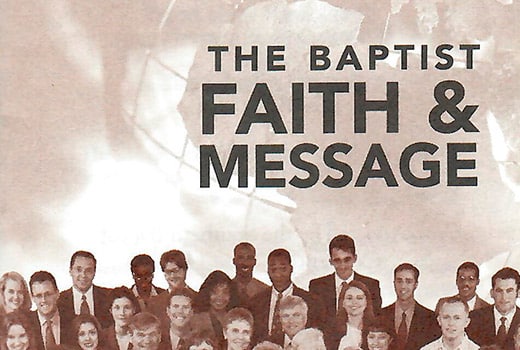Welcome to the first in what we hope will be a long and helpful line of themed editions of The Baptist Courier’s monthly magazine. The Courier will continue to report the news and tell the stories of Palmetto State Baptists as in the past, but several months each year, we hope to build the publication around topics that are relevant to life in the local church — issues related to the Bible, theology, ministry, culture, and Christian living.
Our goal is to give The Baptist Courier a longer and prominent place on our readers’ shelves and to help pastors and other church leaders, laypeople and local churches to grapple biblically with the issues of our day, many of which will remain until our Lord returns. By God’s grace, we hope to promote healthy church leaders, healthy Christians, a healthy denomination, and healthy churches to the glory of our great God.
Why did we choose to begin with a topic seemingly as academic and impractical as confessionalism? Three reasons: (1) Baptists in their healthiest expression have, traditionally, been committed confessionalists, (2) Baptist confessionalism has deep roots in South Carolina (see Peter Beck’s article on the Charleston Confession) dating back to 1767, and (3) in the wake of the SBC’s 2023 annual meeting this past June in New Orleans — a gathering that saw messengers vote to remove three churches for practicing doctrines contrary to our confession of faith — the subject has emerged as a major discussion on the landscape of SBC life.
What does it mean to be a confessional denomination? Does that mean we are a creedal people? Shouldn’t we just leave it at “no creed but the Bible”? Why not? I cannot possibly answer those important questions fully in this small space, but let’s look to one of our leading theologians from the past to establish a couple of important definitions.
B.H. Carroll (1834-1914), the founding president of Southwestern Baptist Theological Seminary, helpfully (and concisely) delineated between a creed and a confession of faith: “What is a creed? A creed is what you believe. What is a confession? It is a declaration of what you believe.”
Some will argue, “Well my creed is Christ and the Bible, I don’t need a confession of faith.” But, as Carroll well said it, “There never was a man in the world without a creed.” Precisely what do you believe about Christ? Jehovah’s Witnesses and Muslims believe in Jesus, but they don’t believe He’s the Savior of the world. They have a creed, but it’s profoundly different than ours. Our confession makes clear that our creed is that Jesus Christ is the way, the truth, the life, the only Savior of sinners — fully God and fully man at the same time. We confess that, along with many other core truths of Scripture, boldly and clearly.
Baptists have long been a confessional people. Particular (Calvinistic) Baptists in England framed their faith in the Second London Confession of 1689, the great grandfather to our present BF&M 2000. General (Arminian) Baptists during that same period in England wrote an excellent — albeit lesser known — confession in the Orthodox Creed of 1679.
For the past 25 or so years, I have been privileged to be part of confessional churches — two of which I pastored — so I’m convinced that creeds and confessions have potential to grow healthy believers and healthy churches, as I lay out in my article, on the place of confessions in the local church. Here’s a couple of additional reasons why I’m so keen on recovering the Baptist tradition of expressing our beliefs in written confessions.
• Creeds and confessions express core, irreducible doctrines of the orthodox Christian faith. They merely state what we believe about God and man and sin and salvation in the person and work of Christ and sanctification and the Christian’s relationship to the world as well as our future glory. We need confident clarity, not halting ambiguity on those things.
• Creeds and confessions are found throughout the Bible. A couple of examples: In 1 Corinthians 15, Paul says that unless Christ is risen from the dead, our preaching is useless and our faith is in vain. That’s a creed, and that’s confessing it. In 1 Timothy 3:16, Paul uses what is likely a fragment from an early confessional hymn to state six key facts about Jesus, beginning it, “Great indeed, we confess, is the mystery of godliness.” Philippians 2:6-11 and the great prologue in John’s Gospel, especially verses 1-5, make important creedal declarations. Scripture gives us clear warrant to do the same. If the Bible is clear, why would we want to be anything less?
• Creeds and confessions declare to a watching world precisely what we believe. Paul wrote, “For I am not ashamed of the gospel …” and neither should Christians be hesitant nor ashamed to confess it.
How are we to take confessions of faith? The great Charles Spurgeon (1834-1832), in an introduction to an edition of the Second London Confession his church published in the late 1800s, summarized it well: “This little volume is not issued as an authoritative rule, or code of faith, whereby you are to be fettered, but as an assistance to you in controversy, a confirmation in faith, and a means of edification in righteousness. … Cleave fast to the Word of God which is here mapped out for you.”
We certainly cannot cover all the issues pertinent to creeds and confessions in one edition of The Courier. I pray you find The Courier’s overview of confessional Christianity among Baptists to be instructive and helpful both in thinking about present debates among Southern Baptists and in growing in the grace and knowledge of the great God we confess to believe.

